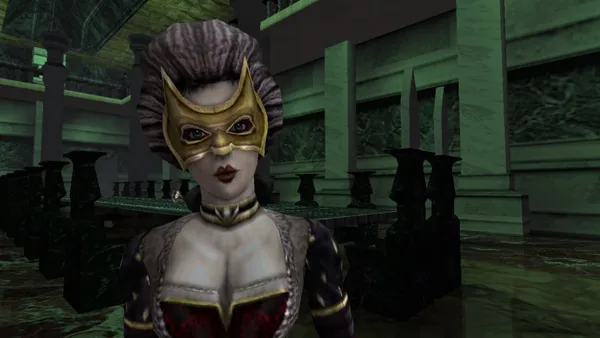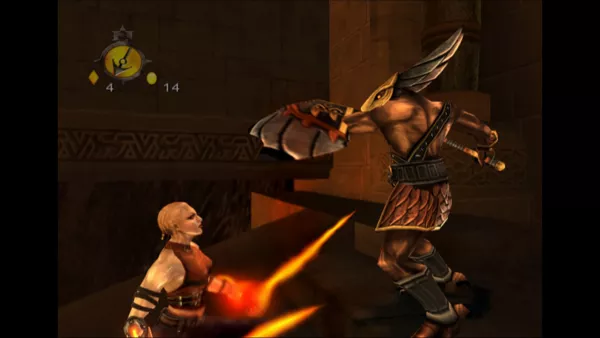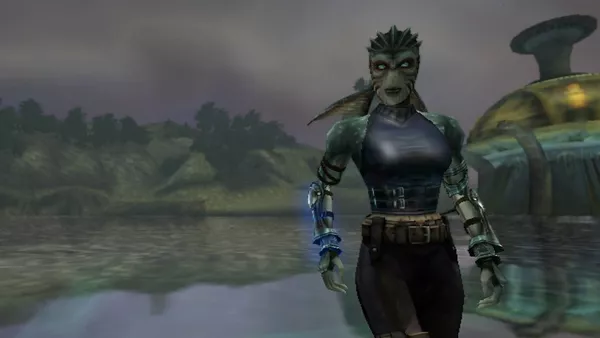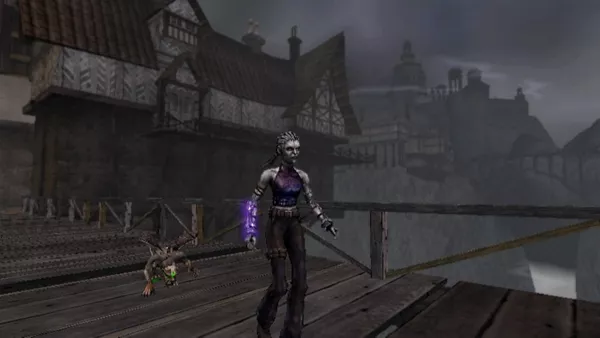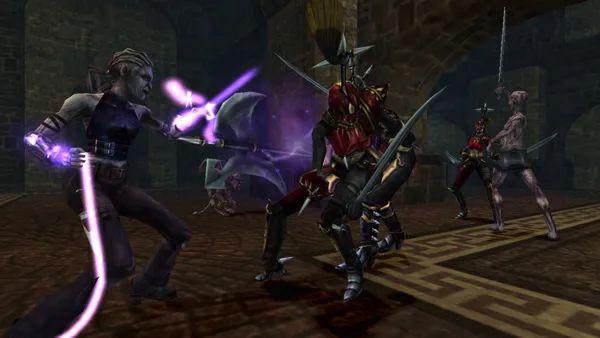Primal (2003) - MobyGames (original) (raw)
aka:Saints: Seinaru Mamono
Moby ID: 9936
- Overview
- Credits
- Reviews
- Covers
- Screenshots
- Videos
- Promos
- Trivia
- Specs
- Releases
- Patches
- Prices
- Forum
- Contribute
Moby Score
7.5
#6,795 of 25.6K
Critics
73%(21)
Players
(21)
Review Ranking
Collected By
110 players
Note: We may earn an affiliate commission on purchases made via eBay, Amazon and GOG links (prices updated 9/30 12:04 AM)
Description official descriptions
Jen is the girlfriend of a metal rocker named Lewis, who have both been through rough times in the past together. A strange and powerful creature attacks Lewis after a concert and runs off into the night with him, leaving Jen injured and near-death.
Jen meets a short gargoyle named Scree, who informs her that she must leave the physical plane Mortalis and accompany him to the demon plane Oblivion. The creature who kidnapped Lewis and left her for dead is an agent of Abaddon who represents Chaos and has been locked in struggle for aeons with Arella, representing Order. The balance between Chaos and Order has been upset and it is Jen's task to restore the balance, all the while hoping to discover the whereabouts of Lewis.
Primal can be described as a "3D platformer", being somewhat similar in its basic gameplay mechanics to Tomb Raider games. Puzzle-solving and action-based combat constitute the focus of the gameplay. The player can switch between Jen and Scree at any time; Jen is capable of fighting, but Scree is invulnerable to enemy attacks. When Jen is incapacitated in combat, Scree must quickly restore her to life within a time limit; failure to do so prematurely ends the game.
Combat is heavily based on "finishing moves" and Jen's ability to transform into demonic forms. There are four demons Jen can merge herself with; they are obtained one by one as the game's narrative advances. These demonic forms allow Jen to use special abilities, which include jumping to extreme heights, unnaturally fast swimming, slowing down time, and using powerful weapons.
Spellings
- Saints (セインツ) 聖なる魔物 - Japanese spelling
Groups +
- Console Generation Exclusives: PlayStation 2
- Gameplay feature: Time manipulation
- Gameplay feature: Transformation
- Games made into comics
- Protagonist: Female
Promos
Credits (PlayStation 2 version)
254 People (213 developers, 41 thanks) · View all
Reviews
Critics
Average score: 73% (based on 21 ratings)
Players
Average score: 4.1 out of 5(based on 21 ratings with 1 reviews)
Amazing technology and production values, but some parts weren't completely thought out.
The Good
Primal has a lot of flaws, but almost all of them are excused by a killer one-two punch of awesome visuals and the very best engine technology I have ever seen in a PS2 game. The visuals, from the textures and modeling to the motion capture, are just superb: Environments are large and ornate; characters are well-modeled and detailed; textures are sharp and appropriate. The gameplay engine, however, is just a marvel if you have any knowledge of how hard it is to program for the PS2: All areas seamlessly merge together with no loading times; you can switch between two characters even if they're in completely different areas of the world (albeit with a slight pause); models morph into different shapes; you can see clear across the gameworld to see real structures on the other side that you can travel to (ie not just painted backgrounds); the list goes on and on. If every PS2 programming team was as good as these guys, the PS2 would get a lot more respect. (The production values stretch to the manual, which is more comprehensive than most PS2 games, to the bonus features you unlock which include interviews with the designers, actors, band, etc.)
The opening of the game is very strong, with a good story and gameplay that eases you into the travel and combat system without screaming "tutorial!" The main character Jen, through traveling to various worlds, gathers additional forms each with various powers: The Ferai form can jump and land greater distances; the Undine form can communicate telepathically to your companion for help; the Wraith form can move instantly ala The Matrix, and the Djinn form has a whoop-ass longsword for ending combat quickly and efficiently. Switching between these forms to get past various puzzles is implemented well (although not as often as I would have enjoyed).
The music is a combination of hard punk courtesy of 16 Volt, and original orchestral music performed by the City of Praque Philharmonic and Chorus. Overall it is one of the best music soundtracks I have heard in a game, not because the music stands on its own but rather because it fits the game areas and moods so perfectly. Along those lines, the voice acting is very professional. And, a surprise to me, the localization has full dialog re-recorded in French, Spanish, etc.
The Bad
What stops Primal from becoming an instant classic is that there are parts of the game where they obviously rushed through things. The first and last worlds are fantastic, with good puzzles and (in the first part) an excellent story. But the middle of the game has some stages that simply don't feel like enough time was spent on actual motivation for being there; you feel like you're in a water world because, hey, wouldn't it be cool if we put a water world into the game... that sort of thing. Another source of irritation is when your companion, Scree, has lines of dialog that are out of character (they sound like a programmer or designer talking, not his character). One example of this is in the forth world, where Scree mentions that "you need your Djinn aspect". I know that doesn't sound odd out of context, but in context it feels very awkward, as if he had just blatantly said something like "we need to get past this puzzle so you can power up". Also, the attempts at humor in the game mostly fall flat -- very flat. With the exception of one of Scree's lines, pretty much every attempt at humor makes you cringe instead of laugh.
The combat is, at first, exciting and fun, as there are finishing moves and some good combat animation. But within a few battles you realize that all you have to do to win most battles is tap the buttons very quickly, turning combat into button mashing. Once you learn that, battles become tedious instead of exciting; since a few of the battles are downright cheap, it doesn't help.
Amongst all of the great engine technology and graphics, there is no lip-sync during the cutscenes, which is distracting.
Finally, while I enjoyed the game, it has a very strong feel of being mainly designed by a woman (Katie Lea, one of the three designers) for teenage/young women -- but with the Mature rating (one swear word and lots of blood spray), the proper target audience will probably never play it. Odd.
The Bottom Line
Although it has combat elements, Primal is mainly an adventure game, and if you look at it in that context, it is a light easy adventure that won't get you too frustrated. More experienced adventurers probably won't be challenged, but if you like a great looking and sounding game, this fits the bill. It's the best looking game for the PS2 I've ever seen.
PlayStation 2 · by Trixter (8951) · 2009
Trivia
Oblivion
The four demon realms of Oblivion (and their occupants) are based around the four classical elements: Earth (Solum/Ferai), Water (Aquis/Undine), Air (Aetha/Wraith) and Fire (Volca/Djinn).
References
- Before battling a guard early on in the world Aetha, Jen says "Hold it, Xena!" (in the English version). In that version she is voiced by Hudson Leick, known for playing the role of Callisto, Xena's arch-nemesis, on the TV show Xena: Warrior Princess..
- When Jen acquires her Wraith form, she destroys a headstone inscribed Lara Croft 2003, referring to the protagonist of the Tomb Raider series.
Soundtrack
The game contains music tracks by rock band 16 Volt. Some of the tracks presented in the game are:* Alkali * At the End (during credits) * Blessed * Happy Pill * Suffering You
Most of the combat tracks are taken from the album SuperCoolNothing V2.0. The band also does a cameo in the game, playing in the club in the opening cut-scene.
The other music, the cinematic tracks, are composed by Andrew Barnabas and performed by the City of Prague Philharmonic Orchestra and Chorus. A suite dedicated to its music was performed at the historic Symphonic Game Music Concert in Leipzig 2003.
Awards
- 4Players
- 2003 – Best Console Music of the Year
Analytics
Related Sites +
- Official Primal Website
The official Primal game Website. - Official Website (Japanese)
Official SCEJ game website. - Wikipedia: Primal
Information about Primal at Wikipedia
Identifiers +
Contribute
Are you familiar with this game? Help document and preserve this entry in video game history! If your contribution is approved, you will earn points and be credited as a contributor.
- Ad Blurb (+1 point)
- Alternate Title (+1 point)
- Correction (+1 point)
- Critic Review (+½ point)
- Group (+¼ point)
- Product Code (+¼ point)
- Related Site (+1 point)
- Release info (+1 point)
- Relation (+½ point)
- Screenshots (+2 points)
- Tech Spec (+1 point)
- Trivia (+1 point)
- Video (+1 point)
Contributors to this Entry
Game added by Weston Wedding.
PlayStation 3, PlayStation 4 added by Sciere.
Additional contributors: MAT, Freeman, Mark Ennis, DreinIX, Patrick Bregger.
Game added August 7, 2003. Last modified March 26, 2024.


